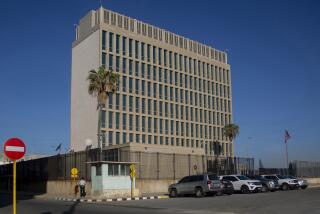Study Links Late-Life Depression to ‘Silent’ Strokes
- Share via
DALLAS — If you’re over 50 and suffer from depression, you may have experienced a minor stroke without even realizing it.
Researchers say they have found a connection between depression and “silent strokes,” brain abnormalities that occur when small blood vessels in the brain become blocked or rupture. They’re called silent because they lack classic stroke symptoms such as slurred speech, blindness and impaired motor skills.
“As we get older, the risk for stroke goes up,” said Dr. David C. Steffens, the study’s lead author and an associate professor of psychiatry at Duke University Medical Center. “The same risk factors for stroke may be the risk factors for late-life depression.”
Researchers studied 3,660 people in 1993 in four communities --Forsyth County, N.C.; Sacramento County, Calif.; Washington County, Md.; and Pittsburgh. They released their findings Sept. 30 in Stroke, a journal of the American Heart Assn.
Doctors viewed the patients’ brains through MRIs--magnetic resonance imaging--to look for small lesions in the basal ganglia. Deep in the brain, the basal ganglia act as a relay station between various parts of the brain.
The lesions, less than 3 millimeters in diameter, appear to have been caused by small strokes. A millimeter is roughly equal to the thickness of a paper clip.
The subjects answered a questionnaire about energy levels, mood, sleep patterns and concentration, which could indicate depression.
Researchers divided patients into four groups based on questionnaire scores. By comparing the most and least depressed, they found that reports of severe depression occurred 40% more among those with basal ganglia lesions.
Steffens conceded, however, that researchers did not consider whether patients had a history of depressive episodes or had received treatment for depression.
“We chose to focus on two medical conditions--hypertension and cardiovascular heart disease,” he said. “Not having a more detailed psychiatric history is likely one limitation of the present study.”
Dr. Hal Unwin, director of the stroke program at the University of Texas Southwestern Medical Center at Dallas, said his only criticism of the study was its reliance on patients reporting their own depressive feelings.
Unwin said the Duke study affirms a connection between depression and stroke that he has found in his own practice.
“Depression does occur in the elderly, and the medication we use to treat depression can actually speed recovery of stroke patients,” said Unwin, who was not part of the Duke study. “Is that because they’re being treated for depression and they’re motivated to work harder, or is it because they’re doing something else? We don’t know.”
Steffens said patients with risk factors for stroke must be monitored closely for signs of depression.
“Depression is often overlooked in the elderly because its symptoms may differ from those seen in younger people,” he said. “Their depression may be more characteristically marked by apathy, a loss of interest in their usual activities, instead of sadness. So, as a result, neither the patients, their families nor their physician may recognize these characteristics as signs of clinical depression.”
Stroke killed 159,942 people in 1996--the most recent year for which complete numbers are available--and accounted for about one in every 14.5 deaths in the United States, according to the American Heart Assn. Stroke is the third major cause of death among Americans, behind heart disease and all forms of cancer.




